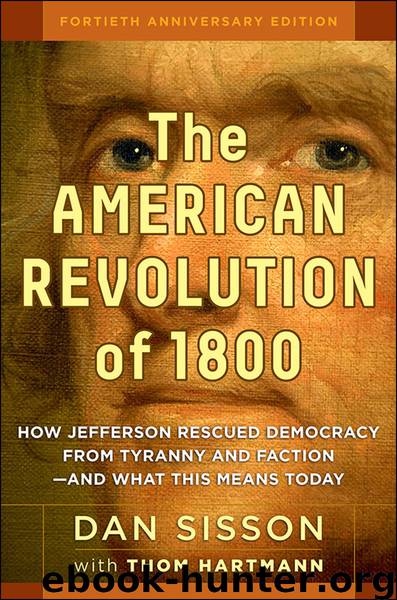The American Revolution of 1800 by Hartmann Thom Sisson Dan

Author:Hartmann, Thom, Sisson, Dan [Hartmann, Thom, Sisson, Dan]
Language: eng
Format: epub
Publisher: Berrett-Koehler Publishers
Published: 2014-09-21T14:00:00+00:00
NULLIFICATION MAKES ITS DEBUT
Asserting this dire conclusion, the Kentucky legislature then went on to announce that “a nullification” doctrine was the “rightful remedy.” Reaffirming its own “principles” of 1798, the new set of resolutions expressed Kentucky’s right to resist “in a constitutional manner” all further violations of the Constitution.46 In this way the resolutions of November 14, 1799, went beyond Kentucky’s principled and constitutional resistance of 1798.
Not only had the Kentucky legislators criticized their sister states for a failure to oppose the administration but they took it upon themselves to declare a nullification doctrine. This dovetailed precisely with Jefferson’s plan: to consolidate opinion among the people on the idea of resistance. And indeed this had taken place.
Three weeks after the Kentucky Resolutions had passed, John Breckinridge, now the Speaker of the Kentucky House of Representatives, wrote to Jefferson regarding the nullification clause: “In the lower house, there was not a dissenting voice.” And while a few state senators had voiced their “considerable division,” the future would find “the great mass of the people…uncontaminated and firm” in their support.47
The outlines of Jefferson’s strategy were becoming clearer. Finding it necessary to deal with a rapidly deteriorating national situation, he was being prodded by Madison to become more practical and less theoretical. The next ten months would see him responding to that pressure and also paying more attention to his role as a political figure. Although still maintaining the reins of leadership, he was forced to elevate himself above the rough and tumble of politics.
As a result, when Virginia’s next response to the constitutional crisis was being formulated, Jefferson discovered that his closest advisers, Madison and James Monroe, were against his direct participation. Unwilling to risk even the hint of a scandal involving Jefferson in a protest against the administration, they convinced him that he had to remain silent. Yet in the month that Madison was researching and writing his famous Virginia Report of 1799-1800, Jefferson could not help presenting him with a set of guidelines.
Download
This site does not store any files on its server. We only index and link to content provided by other sites. Please contact the content providers to delete copyright contents if any and email us, we'll remove relevant links or contents immediately.
| African Americans | Civil War |
| Colonial Period | Immigrants |
| Revolution & Founding | State & Local |
Cat's cradle by Kurt Vonnegut(13868)
Pimp by Iceberg Slim(12931)
Underground: A Human History of the Worlds Beneath Our Feet by Will Hunt(11257)
4 3 2 1: A Novel by Paul Auster(11050)
The Radium Girls by Kate Moore(10907)
American History Stories, Volume III (Yesterday's Classics) by Pratt Mara L(4826)
Perfect Rhythm by Jae(4621)
Wiseguy by Nicholas Pileggi(4586)
The Fire Next Time by James Baldwin(4343)
Paper Towns by Green John(4169)
A Higher Loyalty: Truth, Lies, and Leadership by James Comey(4033)
Pale Blue Dot by Carl Sagan(4001)
The Mayflower and the Pilgrims' New World by Nathaniel Philbrick(3915)
The Doomsday Machine by Daniel Ellsberg(3731)
Too Much and Not the Mood by Durga Chew-Bose(3695)
Killers of the Flower Moon: The Osage Murders and the Birth of the FBI by David Grann(3609)
The Borden Murders by Sarah Miller(3590)
The Sympathizer by Viet Thanh Nguyen(3481)
Killing England by Bill O'Reilly(3455)
